While looking for my birth family in Korea, I discovered something I never expected to find
It felt, to some extent, like this search for my birth family was over before it started.
Like it was going to be a waste of everyone’s time.
Kyeong Mi, the woman who greeted and prepared me for my field trip into the South Korean capital of Seoul last month, wasn’t nearly so blunt. She tried to be enthusiastic and was complimentary of the volunteer she’d assigned to help me that day. But she also wanted to manage my expectations.
“What we have is only a little information, unfortunately, right?” Kyeong Mi told me, as we sat across a table from each other in the small, nondescript offices of G.O.A.’L., a Seoul-based nonprofit devoted to supporting Korean adoptees returning to “the motherland.” “I mean, unfortunately, it’s most of the cases for the adoptees.”
According to the paperwork given to my adoptive parents 50 years ago, this was the response to the question “When and under what circumstances did he become an orphan?”:
“The child was found by a passerby on a die (sic) street in Hyunju-dong, Suhdame-gu, Seoul City around 9 a.m. on Feb. 14, 1974; and referred to Suhdaemoon police station.”
Birthplace, unknown. Birth mother and birth father, unknown. I was estimated to be about five months old. But my birth date, unknown.
“So,” Kyeong Mi continued, “we make itinerary based on the limited information.” Which meant the plans were simply a visit to the police station, a tour of the neighborhood, and a stop at a community center to see about posting flyers on its bulletin board touting my search for my birth family.

I hoped it would at least be an interesting and enlightening exercise (this was, after all, my first time in Korea since leaving as a baby in 1974, so how could it not be?), while at the same time expecting it to be futile.
And I was going to be OK with coming up completely empty.
Those who know me best know I’ve always been a little curious about who my birth parents are, but they also know that I have viewed it as more of a reporting challenge or exercise than a deep yearning to connect with biological relatives. I know, too, that finding lost birth parents can be fraught.
But when this particular day started — when this whole trip started — I had no idea where this search would lead. Or, for that matter, what this search would even wind up being truly about.
I have hardly been able to get through telling my loved ones this story without crying.
How I got here in the first place
When I learned I was being offered a free trip to Korea (or somewhat free, at least), I proceeded with caution.
The opportunity was extended by the Korean government via its Overseas Koreans Agency, established in 2023 to provide support for the estimated 7 million “overseas Koreans,” a classification that encompasses Korean children adopted by families in the U.S., Europe, and other countries.
South Korea has been a democracy since the late ’90s, and has observed freedom of expression for a little longer. The country, however, had a long history as a baby exporter in the post-war 1950s, ’60s, ’70s and ’80s, when adoption agencies were widely known to have falsified or hidden documents; and in recent years, adoptee-led advocacy groups have been working to compel the government to make amends. As of yet, it has not. So my natural skepticism made me wonder what the catch might be.

Ultimately, however, it was a no-brainer: When someone offers to fly you to Korea and put you up in a five-star hotel — committing you to participate in a three-day program aimed at familiarizing adoptees with Korea but otherwise letting you show yourself around Seoul before and after — you take it.
It happened pretty quickly. I found out about the program in early February. Just 3-1/2 months later, I was stepping off of a plane in my “motherland.”
I was a little surprised that I wasn’t immediately overwhelmed with emotion. More than anything, I was overwhelmed with discomfort.
Within moments of exiting Incheon’s airport, while trying to grab a taxi, I received a chilly welcome from the woman coordinating the rides. I don’t speak Korean. The woman didn’t speak English. It was a busy evening, and there was a line. The woman was flustered, and got irritated because I couldn’t understand her instructions. Although she didn’t full-on yell at me, I could tell she wanted to.
I wasn’t off to a good start as a stranger in what — under vastly different circumstances — might have been a very familiar land.
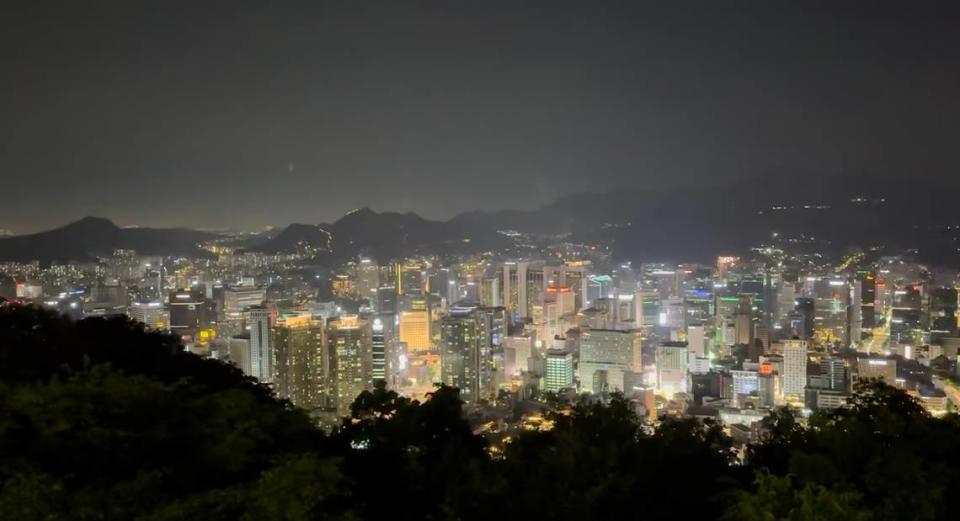
Close relationships forged at high speed
Fortunately, I did arrive in this foreign homeland of mine with a bit of a support system.
I’d come by way of Detroit, where during a layover I’d met another program participant — Katie from Michigan, who was on my same flight — and she was a calming presence during the incident at the taxi stand. She’d been back once before, so her anxiety level was lower than mine, and I kept her close for the first few days so I’d have someone with whom to feel my way around this imposing city of 10 million people. People I looked like, but otherwise had nothing in common with.
Katie and I, meanwhile, had plenty in common. Spouses, kids, successful careers, and, oh, she also was found on the street as a baby and brought to a police station, with no other information available. Birthplace and birth date: unknown. Parents: ghosts.
We talked a little about what that feels like. We didn’t have to, though. We understood so much about each other — that particular part of our identities, at least — without needing to talk about it.
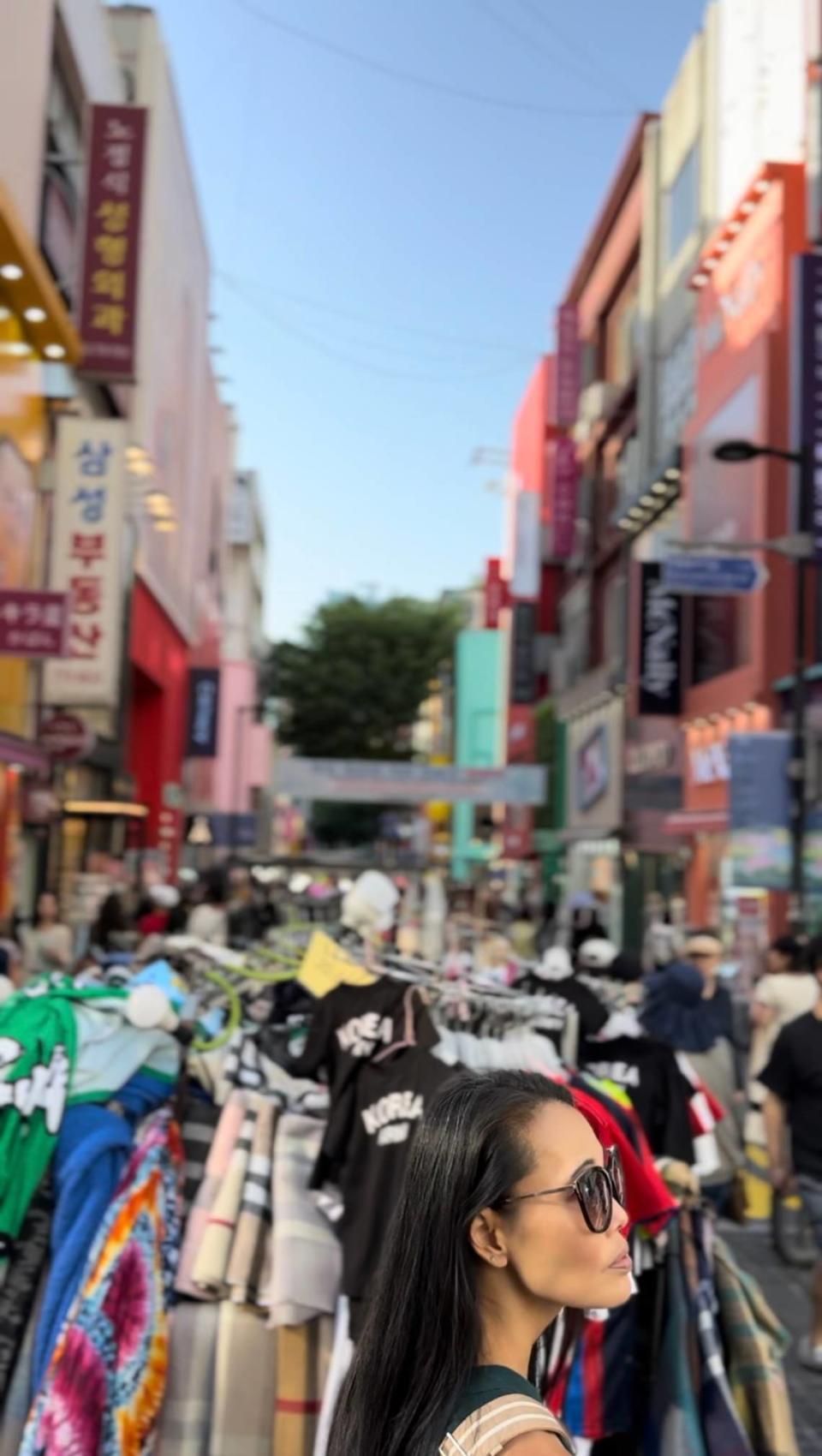
That said, engaging with Korean adoptees is still fairly new for me. For most of my life, I wasn’t very open to the idea.
But in 2022, I wrote an essay for The Charlotte Observer after doing a deep dive into my available adoption records and reflecting on what the information meant to me. I tried to connect some feelings to it, although in hindsight I’d say that even once the story was published, I was pretty emotionally detached.
I had treated it as more of a rote analytical exercise than as any sort of real, concerted effort to find myself or to connect with my Korean-ness.
That started to change a few months later, when I met (as a direct result of my article) Dee and Becca, Charlotte-area twins who were adopted as sisters and by pure chance found the birth father they weren’t even looking for during the pandemic. I knew them first as a reporter; since then, we’ve formed beautiful friendships, rooted at least partly in our shared histories as Korean adoptees. The power of both the professional and personal conversations we’ve had — about adoption, and family, and Korea, and love, and loss — helped start to pry open parts of my heart and mind that were closed for years.
My bonds with Dee and Becca, however, took months to develop because of busy lives and limited interaction.
In Seoul, close relationships were forged at high speed if for no other reason than nearly unlimited access to each other for hours, days at a time. By my third day hanging out with Katie, she felt like a best friend.
Then the conference started and she got pulled in other directions, mainly because she had a role in helping lead parts of the program. But I would soon meet other participants with whom I would establish connections as strong as the one I’d developed with Katie.
Three in particular, each with different adoption stories to tell.
Angela, from Oregon: Relinquished for adoption at birth; initiated a search in 2016 that ultimately yielded photos of her birth mom passed along through the adoption agency ... but also news that her birth mom now had a family that wasn’t aware of Angela; received a promise of a response letter from her mother; ultimately never heard from her mother again.
Kaitlin, from Ontario: Born, according to her paperwork, to a single woman who was impregnated by a married man; relinquished so as to hide their affair; adopted at 4 months old; has never known her birth parents’ identities.
Jeong, from California: Told by her adoption agency that she’d been an unwanted baby; learned in recent years, after an extensive family search led to her biological mother, that the hospital where she was delivered had trafficked her as a newborn — after telling her mom that Jeong had died in the womb.
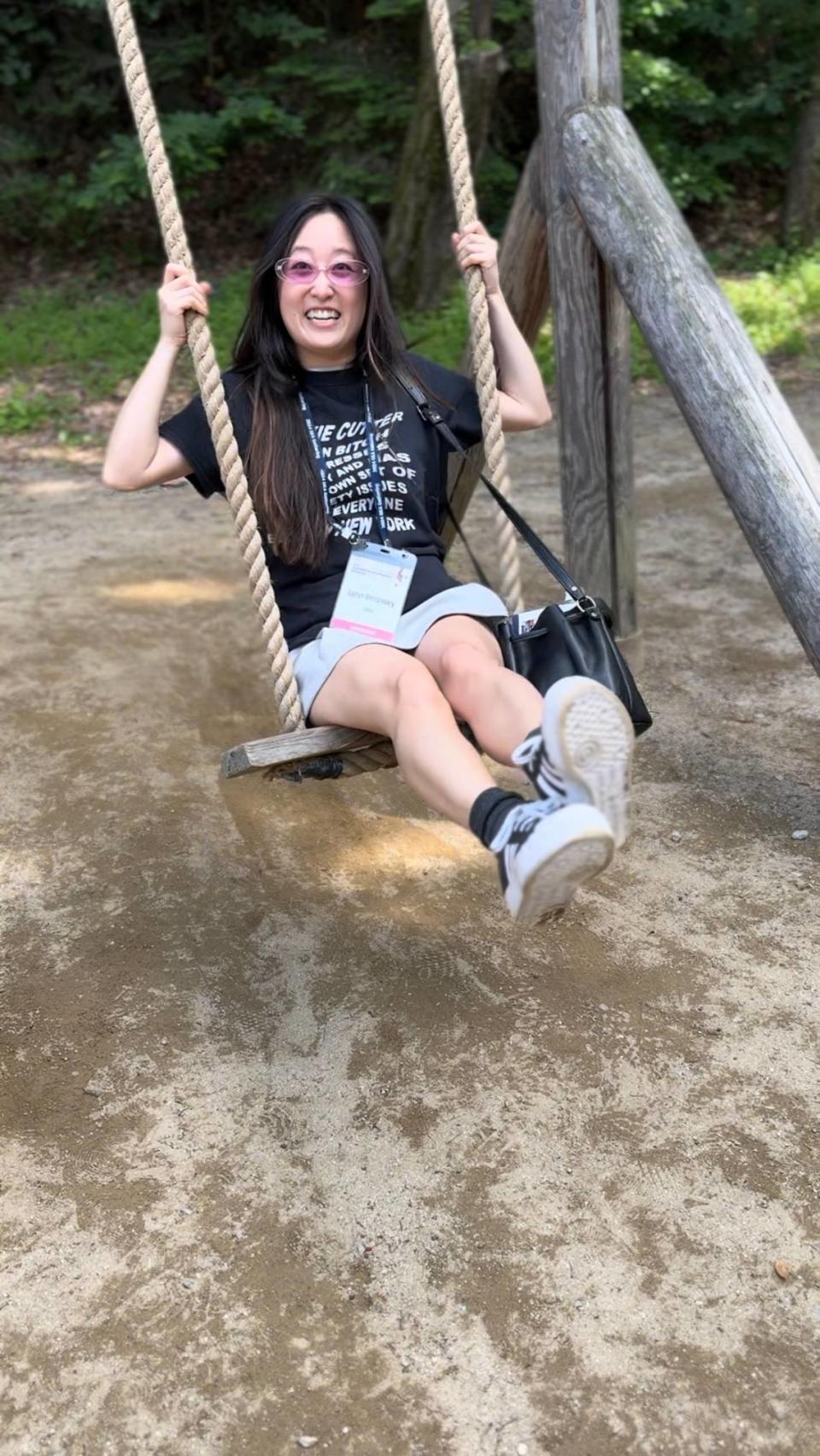
Origin stories that were disparate, but people who all shared a unique sense of grief and loss.
I think the reason I tended to avoid other Korean adoptees when I was younger is because I think I worried it would further isolate me as “different,” and therefore make me insecure, or self-conscious, or uncomfortable. It’s had the opposite effect: They make me feel more at ease. Safer. And it’s not just that they also are Korean adoptees. Personalities obviously need to click. But when they do, well, there’s an immediately baked-in depth to the relationship that will never exist in my relationships with non-adoptee friends.
I’m grateful to now be open to creating those types of bonds.
I had no expectation, however, of developing consequential relationships while in Seoul beyond the confines of the adoptee-focused program I was participating in. I figured it was likely that, beyond those who I would come into contact with as a foreign tourist, the actual citizens of my birth country would have pretty limited interaction with me.
I figured I was in for more disdain — like that woman at the taxi stand showed for me — than acceptance, or grace, or warmth.
I didn’t realize until partway through my visit that, in fact, those feelings would wind up enveloping me. All I had to do was put myself out there.
‘Hard, complex, and at times troubling’
Before I explain further, I need to reiterate: It’s never been my dream to find my birth family.
I’ve never longed for a teary chance reunion or a lifelong relationship. If anything, in recent years, the idea has grown slightly less appealing.
When I interviewed Dee and Becca for the story about them accidentally finding their birth father, Dee told me: “We’re trying to figure out what having a relationship moving forward looks like. Because we want to have a relationship, and we’re happy to know now, and know more about our story, and the truth, and all of it. It’s just ... it’s a lot, you know?”
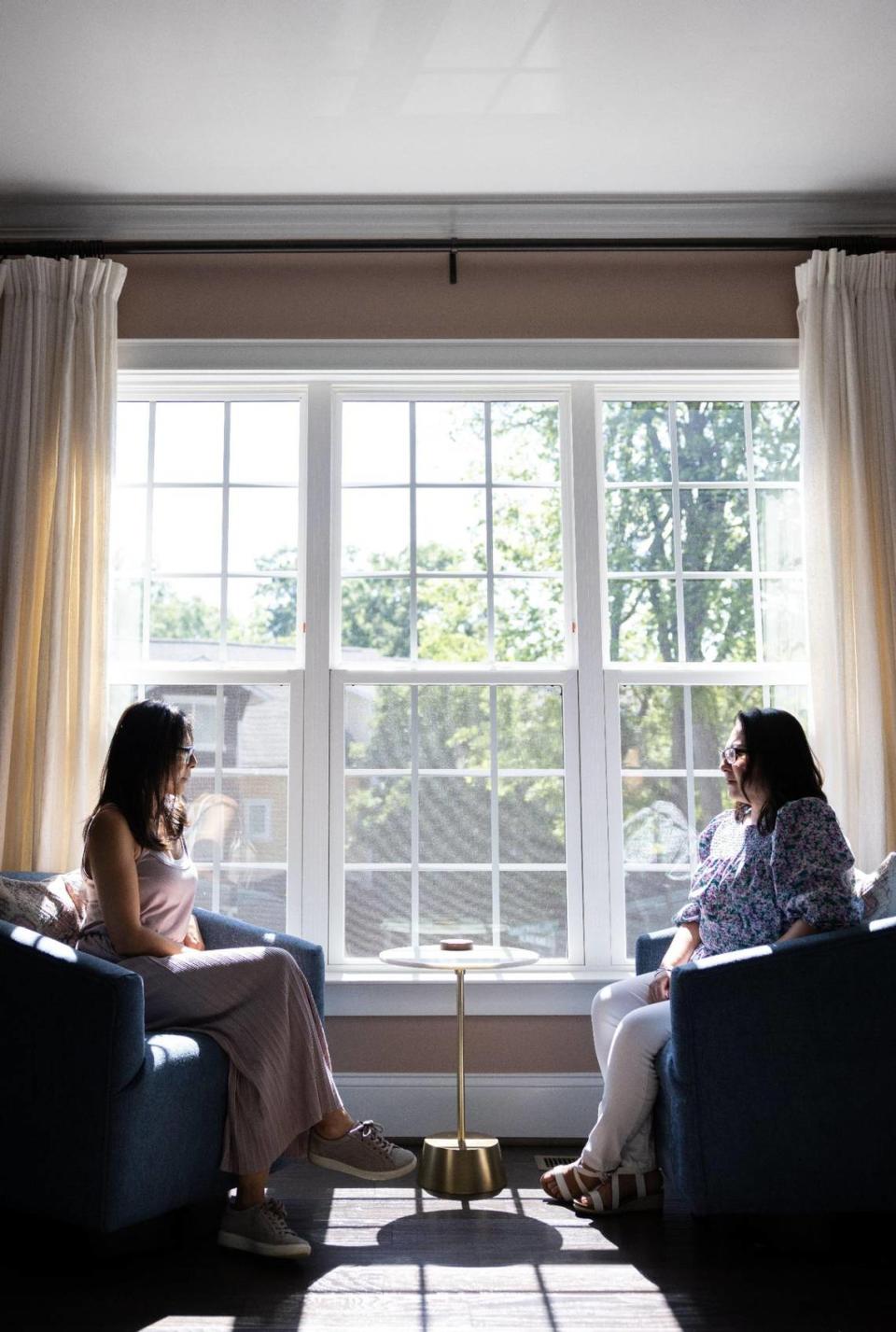
And on the first night of the conference last month, another fellow adoptee — Adam, from the D.C. area — stood up and cautioned all of us to not think about finding your birth family as being “lucky.”
I wasn’t taking notes at the time, but I emailed him afterward and he replied to summarize.
“The long-term relationship with my birth mother really just is a bit hard/complex,” Adam told me. “We have cultural, language, and personality differences that just make it hard to have a decent or solid relationship.” While he’s not sorry the connection was made, he explained, “it really just adds complexity. I have spoken with a fair share of adoptees and we have all found it to be hard, complex, and at times troubling ... (trying) to navigate around the new social dynamic of this added ‘family.’”
Not necessarily a ringing endorsement.
That said, I certainly wouldn’t turn down the opportunity to know the answers to my personal mystery. I’m curious enough about my birth parents’ backstories and what circumstances caused us all to separate. I’d like to know if I have siblings. I’d like to know if I was actually abandoned on the street, or whether that’s a lie.
So in the past, I’d taken some basic actions. I’m in 23andMe and Ancestry’s systems. I submitted my DNA to the Korean consulate in Atlanta, and that DNA was entered into a database maintained by Korea’s National Center for the Rights of the Child.
But those were things I could do from my sofa in Charlotte. Since I was actually going to be in Korea, I thought: Shouldn’t I do everything I realistically can?
‘I came to Korea to find myself’
I spent six of my nine nights in Seoul in hotels. For the remaining one-third of my trip, however, I booked space in a hanok — essentially a traditional Korean house characterized by simple, serene accommodations.
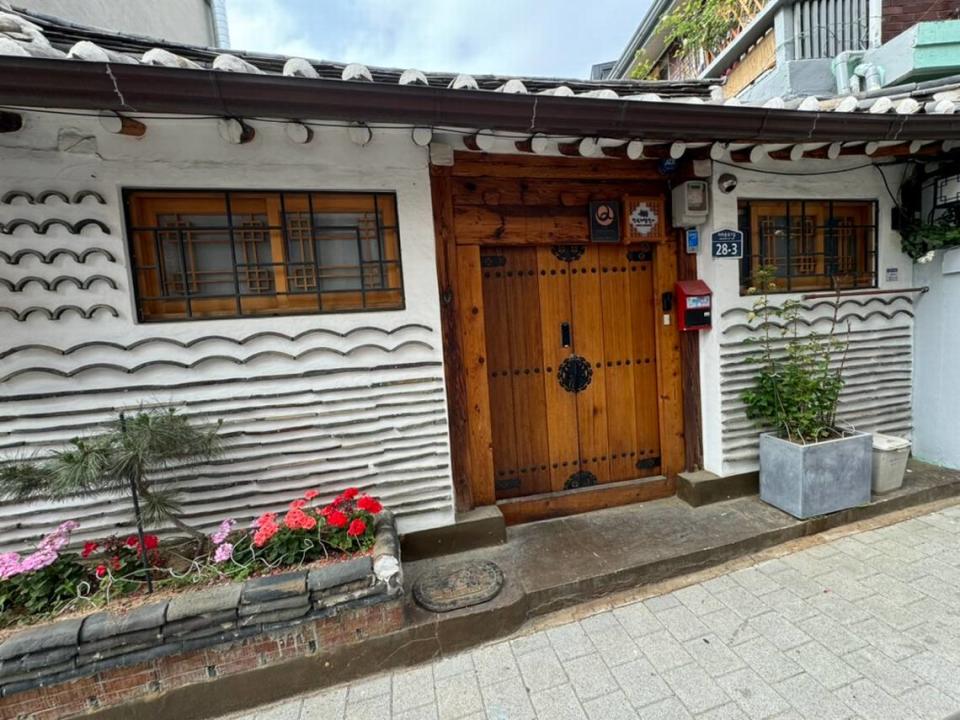
Upon checking in, I introduced myself to my hosts, Mr. Shin and Mrs. Lee, a retired couple who was maintaining an income stream and a desire to live vicariously through foreign travelers. Though their English was far superior to my Korean — I know only a couple of phrases — they were difficult to understand. But I appreciated the warmth they both emanated: Mr. Shin and Mrs. Lee smiled easily, and often laughed at their own jokes even if I couldn’t quite make them out.
Right away, I told them I was a returning adoptee, in Seoul as part of this government-sponsored program for adoptees. I’m not 100% positive, but I really don’t remember ever telling them I was doing a formal birth-family search during my visit.
They did seem to take a particular interest in me from that point on.
The next morning, after Mrs. Lee served me and four of their other guests a breakfast that included bibimbap (a rice bowl topped with sautéed vegetables and marinated meat) and kimchi, she sat down at my table for one and started a conversation.
After some initial small talk, she eventually started meditating on the fact that I had been adopted. She seemed to allude to Korea’s past negative reputation for supporting deceptive practices to send babies to other countries. Then, without warning, her eyes filled with tears as she gently touched my arm and told me how sorry she was for me. How her heart broke for me.
I felt myself beginning to well up, too. Not for me, but for her. For her extraordinary, unexpected empathy.
She excused herself to the kitchen. I could see that it took her another few moments to collect herself. I needed one myself.

A couple days later, Mr. Shin walked me to a nearby coin-operated laundromat, and after starting the washer we went around the corner to grab a bite to eat. He ordered us a bottle of makgeolli (a milky rice wine), then taught me some etiquette regarding how to pour and be poured for.
I enjoyed hearing about his life, his family and his adventures in running a guesthouse — which led to him recounting a story about another adoptee who had stayed with them. He described her as a woman from Europe traveling solo, and started to share a comment she’d made to him.
“‘I came to Korea to find —’” Mr. Shin started to lightly sob. I let a few seconds pass, then thought I could help him complete the thought.
“To find ... her birth family?” I guessed.
Now tears were streaking down Mr. Shin’s face. He shook his head. When he finally was able, he said, “She said, ‘I came to Korea to find myself.’”
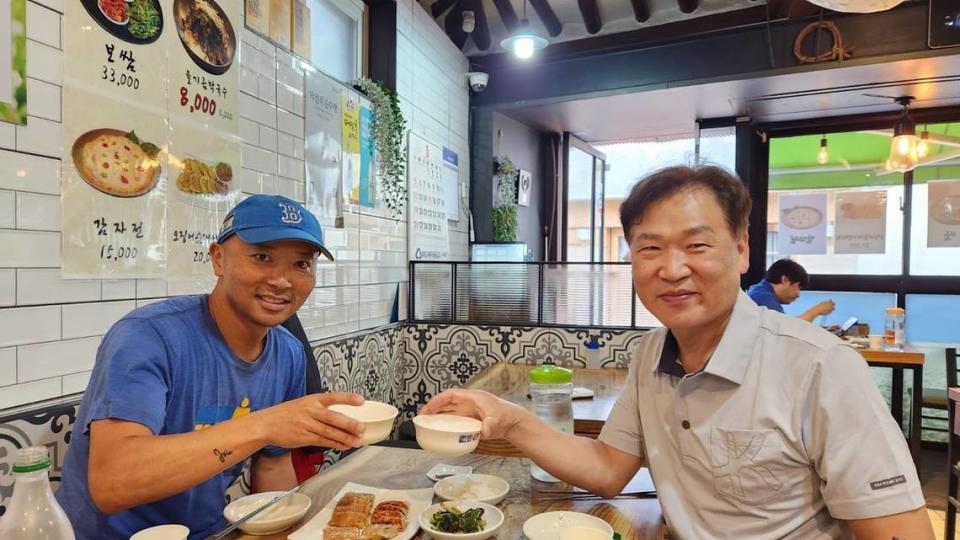
After my trip, in direct messages on WhatsApp, I would ask him to try to explain what made him so emotional, and he would express to me a deep remorse for Korea’s role in sending so many of its children away from the country in the past. “We cannot help but honestly confess,” Mr. Shin wrote on behalf of himself and Mrs. Lee, “that we feel embarrassed as Koreans. This is why, when a (guest) says that he or she is a Korean adopted overseas, we cannot suppress our sorrow along with the deep pain in our hearts.”
I obviously have an extremely limited knowledge of Korean culture. But my understanding, at least, is that Koreans perceive the family unit as the foundation of society, and Koreans do not hug anyone who isn’t personally close to them.
On the day I left their guesthouse, Mrs. Lee hugged me twice, as she appeared to fight back more tears. Then Mr. Shin walked me up the street to meet my Uber, and as it arrived, he also pulled me into a hug. “I hope,” he told me, as his eyes moistened once more, “you find your family.”
I probably should now tell you what I found when I actually tried to look.
We didn’t have much to go on
The volunteer who was to be my guide for my “active search” that day looked like she was just a kid — and she was: 22, a year younger than my daughter. She wore baggy jean shorts with holes in them, and a loose windbreaker with paint stains on it.
My first impression was, Oh no.
But within the first 10 minutes, I could tell there was more to Rosa than met the eye.
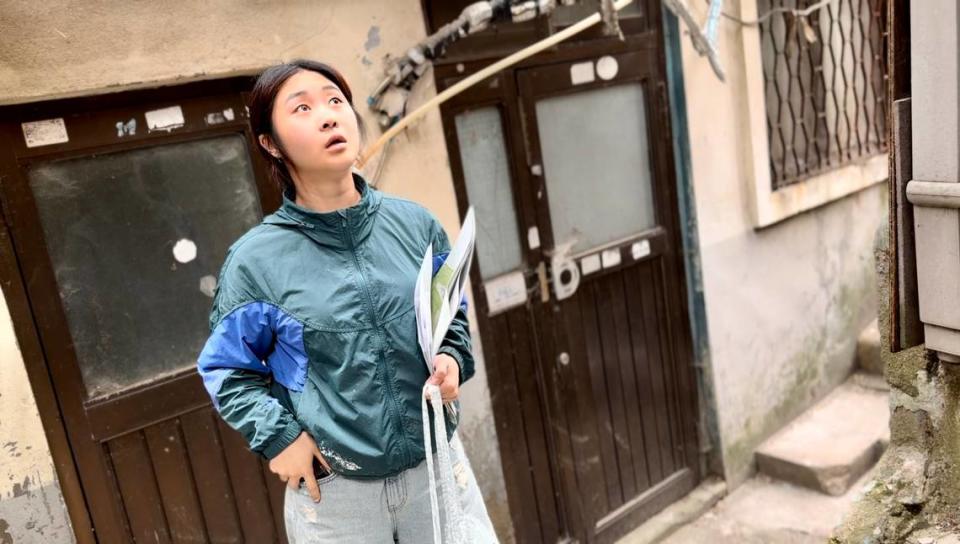
As we made our way to the Seodaemun District police station (where I was allegedly turned in as a baby), and I learned that she’d spent most of her childhood in the U.S. foster-care system. Mom suffered from mental illness. Dad, an immigrant, had been deported back to Korea. At 17, she reconciled with her father and returned to Korea to study at a university. She also started helping adoptees, friends from back in the U.S., with birth-family searches as a hobby. When she stumbled upon G.O.A.’L. and its more formalized search efforts, Rosa became a volunteer.
Her experience showed. She had no trouble approaching older adults and explaining who we were and what we were trying to do. She did it at the police station, where — with no appointment, no warning we were coming that day — she and I were escorted inside and upstairs and treated with respect and patience as we filled out the paperwork to establish my status as an adoptee searching for birth-family members, and as I was administered another DNA test.
She did it when we arrived in the nearby Hyeonjeo-dong neighborhood (the one I was allegedly found in as a baby), marching up to elderly-looking people on the street to ask them how long they’d lived in the area, or for information about it.
Like I said, though, we didn’t have much to go on. There wasn’t really much to do.
We had a handful of flyers with my photos and my (very short) story on them, but it’s been 50 years. I probably have only a slightly better chance of finding my birth parents than I do of hitting the Powerball.
On top of that, even the points of interest on our list were turning out to be disappointments. While our host at the police station was walking us out, he explained that the physical building we were in was not the same building I had been turned into. That building was being renovated. Whatever sense of nostalgia I had hoped to conjure just by inhabiting the same space, in an instant, poof, gone.

Then in Hyeonjeo-dong, as we walked past high-rise apartment towers, Rosa said they’d been built in the ’90s after much of the original neighborhood was razed. So, in other words, if I’d been found on a street in that swath, the street likely didn’t exist anymore.
This was beginning to feel mostly pointless.
But then we arrived at what we figured was our last stop — the local community service center called a jumin, which in very loose terms is like a local DMV office in the U.S. — and a whole new adventure began.
‘It is so far above and beyond’
Rosa explained to someone at the front desk who we were, and that we hoped to speak with anyone who could tell us what the area used to be like.
Within a few minutes, a man in his 60s — described as “the office manager” — emerged from the back and started conversing with Rosa in Korean while they looked over a map of the area. She didn’t translate everything, but explained the man indeed knew a lot about the history of Hyeonjeo-dong.
About 10 minutes in, he pointed her to a small section on the very edge of the map that could be worth visiting. It was impoverished. Now falling apart. But it hadn’t been demolished, and it might help me envision what the area was like in 1974. Ten minutes after that, he announced he was going to make several copies of my flyer that he would post in places in the neighborhood where seniors gathered; we figured he meant he’d do it later. Then — and I have no idea why he waited so long to say this, but — he revealed that he himself had lived and gone to school in that small section as a boy, in roughly 1972, only a year or so before my birth.
Rosa and I talked about walking over to look around after we had lunch. Out of nowhere, the man said he was going to bring us there himself.
Another 15 minutes later, we stepped out of a city truck onto the crumbling concrete of Tongil-ro 17-gil, a dead-end street lined with decaying, empty-looking residences and small businesses, piles of household junk, overgrown weeds. But he beelined for a community center for the elderly that turned out to be quite active in spite of the desolate facade; we were greeted at the door by a woman who guided us to an upstairs room where about a dozen older women were situated.
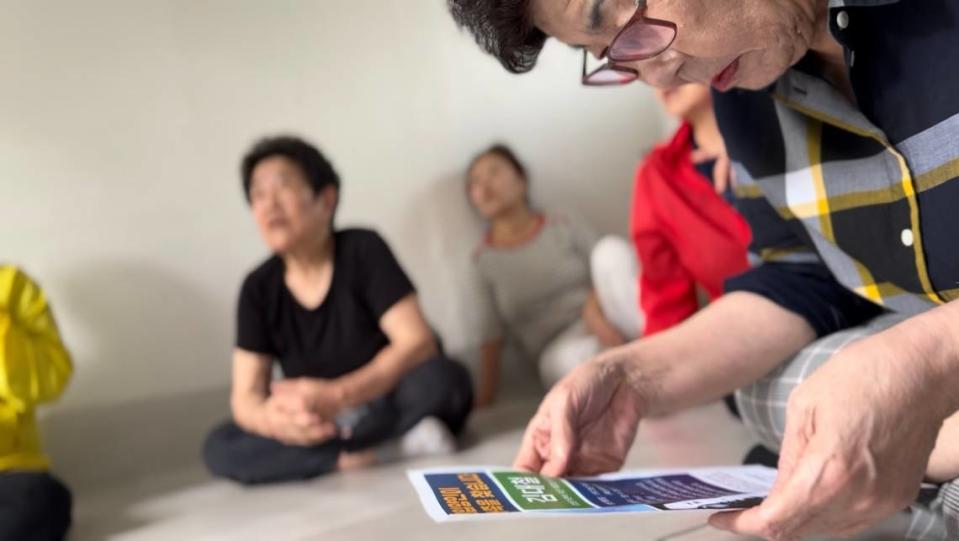
The man passed around a few of my flyers and launched into a passionate presentation — in Korean, so I couldn’t understand a word.
I asked Rosa what he was saying. She told me, “Your story ... and he’s asking them, ‘Could you tell your friends?’”
He waved his arms as he continued on for several minutes, which I found hugely impressive, because there were only a couple of sentences’ worth of information on that flyer. Meanwhile, the women (who Rosa told me were saying they’d all lived there since at least the ’70s) asked questions, made comments to him and among themselves, studied the flyers.
When the man finally finished, the women smiled, nodded at me, and a few said something in Korean.
“They all wish you luck,” Rosa told me.
It blindsided me, emotionally, to have a stranger telling my story with such a profound intonation, in a room full of people who possibly had been living all this time not too far from where I was born.
On the way out, the man taped a flyer to a wall in the hallway. We then walked farther up the street and found a group of three more women outside of a makeshift convenience store — and he launched into the same spiel, maneuvering around to tape another flyer to the outside of the building.
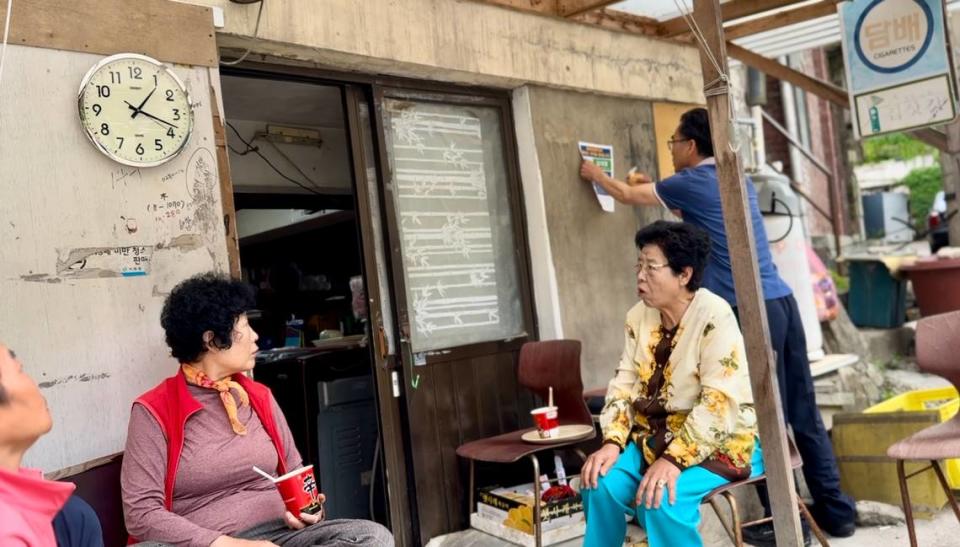
After that, we made our way back toward the office, to the site of a more modern senior center ... where he led us in and went through the same motions. And then we went to yet another, where after he finished talking, an elderly inhabitant of the center rose to his feet, approached me, shook my hand, embraced me, and said a few words.
Rosa translated for me: “‘You need to find your family.’ ... He wishes you luck.”
The resident shook my hand again, hugged me again and said, through Rosa, “‘You will find your parents.’”
At this point, we were a short walk away from the office where we started. We’d been gone for nearly an hour. Also at this point: I was almost at a loss for words.
I tried to ask what had motivated him to do this for me. I may have phrased it too complicatedly, or Rosa may have translated it too roughly, but I didn’t get a satisfying answer. So then I said to Rosa, “Well, please, please convey to him how grateful I am that he has spent this time with us. It is so far above and beyond.”
She did. He simply closed his eyes and nodded.
I need to emphasize here that this man didn’t know we were coming into his office that day. I don’t know what his actual job description is, but I know helping a complete stranger — who he can’t even communicate with — by spending a good chunk of his day in complete and utter service to that complete stranger isn’t in it.
And then ...
Right before I thought we were going to say our farewells and let the man get back to work, Rosa asked him for a restaurant recommendation. He nodded again, and without hesitation proceeded to march us several blocks up the street to a busy Korean donut shop, where he waited in line to buy Rosa and me each a large sack of the fried cakes. After shoving those into our hands, he led us to a restaurant in a nearby indoor market and exchanged a few words with the worker there. Rosa explained that he was buying us lunch.
I vigorously shook my head. “Please tell him,” I said to Rosa, “that I just can’t let him do this. After all he’s done for me: I’m buying lunch.”
She told him. His eyes peered at me over the top of his glasses and under his bushy black eyebrows, then he gently grabbed my arm with one hand and held up the palm of his other. He made a sharp, quick bow towards us — and was gone.
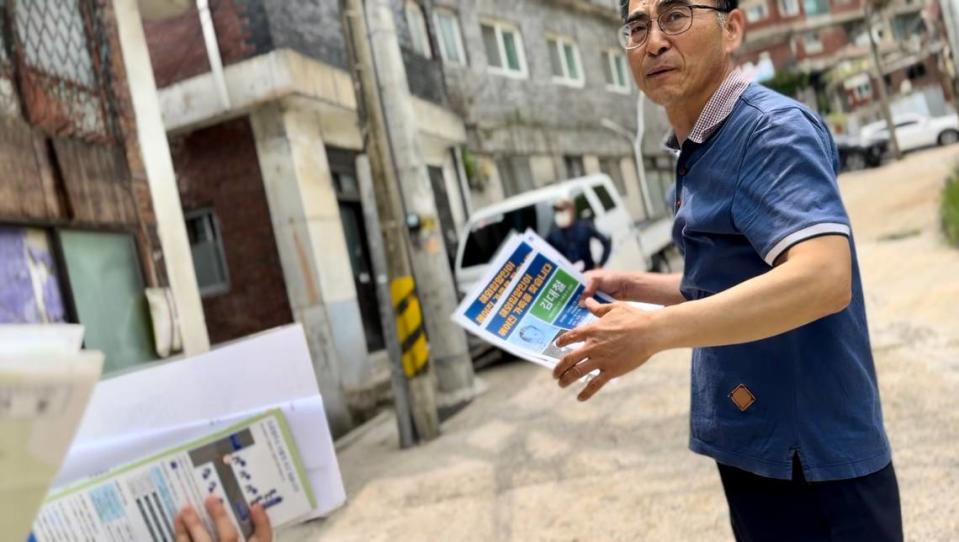
And now I feel more complete
In the three weeks since I left Korea, I’ve exchanged several messages with Mr. Shin, who I hope to someday stay with next time, when my wife and daughter join me.
I’m in pretty much daily contact with Katie, individually, and with Angela and Kaitlin, who are in a group chat with me that we’ve named 선택된 가족 — which means (if Google Translate did its job correctly) “chosen family.”
Rosa and I also have emailed quite a bit. She’s returning to the U.S. to attend grad school in New York City in the fall; perhaps our paths will cross again in America.
Meanwhile, I’ve failed in my various efforts to track down the man from that government office.
Rosa gave me what appeared to be his work email address, which I used the week after I left to send a note. I have no idea whether the address was correct. No idea whether he received it.
I do know that, last Friday, he retired.
I also have since learned his name — Jaehwan Woo — which, to make a long story short, hasn’t been terribly helpful. It’s not an uncommon name, according to Facebook and Google.
Still, every single night since that day, when I’ve closed my eyes to go to sleep, I’ve thought of him.
I’ve wondered, endlessly, why he did what he did. Did the fact that he grew up in what might have been my neighborhood touch him in some way? Did I remind him of someone? Would he have done that for any returning adoptee?
Which leads me to thinking about Mrs. Lee, and Mr. Shin, and the striking empathy they feel for Korean adoptees, individuals who in their minds have suffered an unimaginably heartbreaking loss. Which leads me to thinking about Rosa, and her journey, and how it led her to do the things she does to try to connect people interested in finding their birth families. Which then leads me to thinking about my new Korean-adoptee friends, that whole notion of “chosen family,” and the precious nature of it to someone like me.
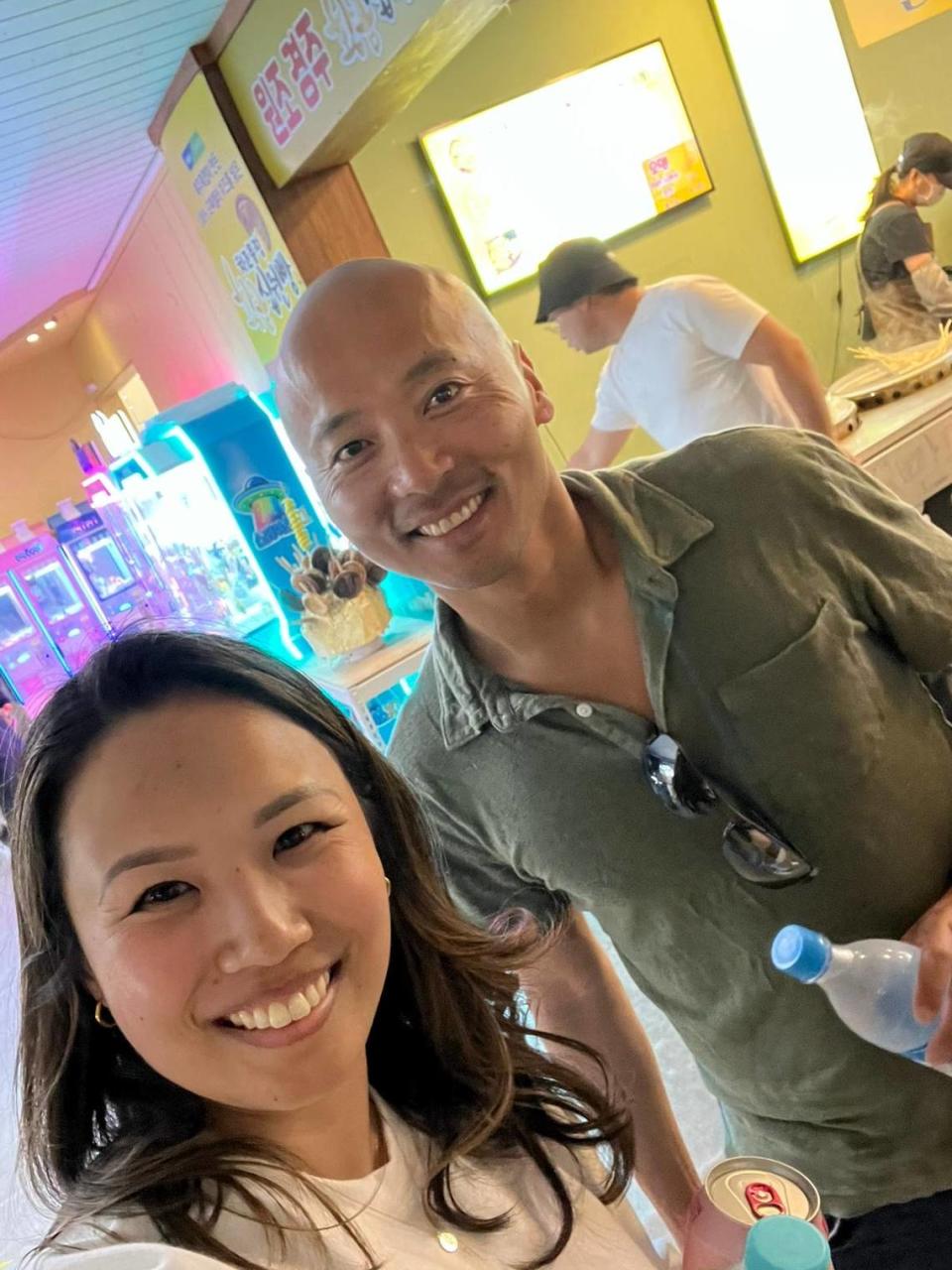
And after lying awake doing all that thinking, I’ve come to the same conclusions before drifting off: While this is subject to change — since we all evolve and shift our priorities as we age — I feel confident that the next time I go back, I won’t do anything at all related to looking for my birth family. For now, I believe I’m ready to put that to rest.
But when I return, I will continue to try to find myself, because I think there’s still more of me there.
And no matter how little information I have to go on, or how futile it seems, I intend to do what I can to search for Jaehwan Woo.
I at least owe him lunch.


